

Austeja Norvaisaite
Growth hacker and strategic partnership coordinator. Passionate about blending creativity with data-driven insights to craft accessible, resonant content for diverse audiences.
Ecommerce Startups in Thailand: Competing with Lazada & Shopee
E-commerce startups in Thailand competing with Lazada & Shopee face one of the toughest challenges in Southeast Asia’s digital economy. Lazada and Shopee dominate with massive budgets, logistics networks, and customer loyalty programs.
Yet opportunities remain for founders ready to innovate, find niche markets, and create unique customer experiences. In this article, we’ll explore why these giants dominate, the opportunities and challenges for new players, proven strategies to build trust, marketing tactics for growth, funding options, and real case studies. By the end, you’ll know how Thai ecommerce startups can compete and thrive in 2025.
Need help with branding? Book a consultation and get customized strategies for your startup's growth!
Table of Contents
Why Lazada and Shopee Dominate Thailand’s Ecommerce Market?
E-commerce startups in Thailand competing with Lazada & Shopee face an uphill battle in 2025. These two platforms dominate with logistics power, huge marketing budgets, and loyalty programs that keep millions of Thai buyers returning. Lazada, backed by Alibaba, owns about 35% of the e-commerce market in Thailand thanks to integrated warehousing, fast delivery, and AI-driven personalization. Shopee, on the other hand, holds nearly 50% of the market, fueled by flash sales, mobile-first shopping, and free shipping campaigns.
Together, they control almost everything in online retail, from electronics to fashion. For smaller ecommerce startups, competing head-to-head on price or logistics is nearly impossible. The smarter path is finding niches these giants don’t fully serve, building customer loyalty, and delivering personalized experiences that Lazada and Shopee cannot easily replicate.
Opportunities for Ecommerce Startups in Thailand 2025
Despite Lazada and Shopee dominating, ecommerce startups in Thailand still have room to thrive – especially in untapped niches, emerging social channels, and mobile-first experiences.
Thailand’s ecommerce market grew by 14% in 2024, reaching 1.1 trillion baht, and is projected to hit 1.6 trillion baht by 2027. At the same time, social commerce is booming, with the market expected to expand by 18.6% in 2025, reaching US$5.2 billion. Brands that tap into social-first shopping via TikTok Shop, Facebook shops, or influencer livestreams are gaining traction fast.
Here are high-potential ecommerce niches thriving in Thailand:
| Niche Category | Market Opportunity |
|---|---|
| Eco-conscious Products | Rising interest in green, sustainable goods |
| Health & Wellness | Demand for organic, local, and health-focused products |
| Home Décor & DIY | More home time & decor spending since pandemic |
| Pet Supplies | Growing pet ownership and premium pet product trends |
| Affiliate & Social Sales | 83% of consumers buy via influencer or affiliate links |
These niche opportunities offer advantages over mass-market platforms. For example:
Eco-conscious products can target younger urban buyers willing to pay a premium.
Health & wellness brands benefit from stories, trust, and repeat purchases.
Home décor and DIY supplies are in demand, as remote work has triggered interest in making homes more personal and comfortable.
Pet products gain traction as pet ownership rises nationwide.
Affiliate and influencer marketing delivers high ROI – 83% of Thai consumers buy based on trusted recommendations.
Thailand also benefits from its mobile-first culture, with 90% of internet users shopping via mobile. Digital-first services, such as mobile wallet integrations and in-app shopping, open up growth beyond Lazada and Shopee’s domination. For e-commerce startups in Thailand, competing means focusing on these underserved niches, leveraging social commerce, and delivering mobile experiences that build trust and loyalty, not just discounts.
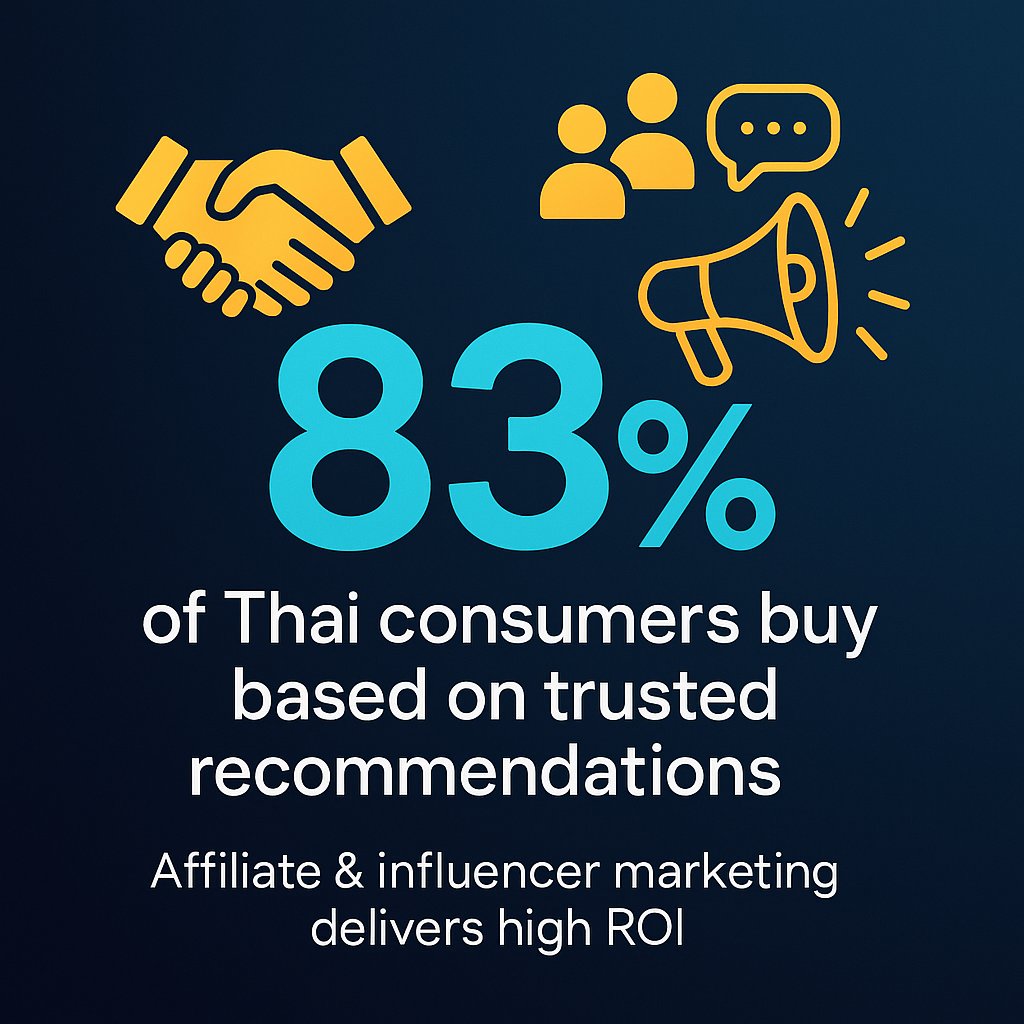
Key Challenges for Ecommerce Startups in Thailand 2025
While opportunities are clear, e-commerce startups in Thailand competing with Lazada & Shopee face real obstacles. Big platforms dominate logistics, marketing, and customer trust. Startups must overcome these barriers to scale.
One of the toughest challenges is logistics and last-mile delivery. The speed and cost of delivery heavily influences Thailand’s e-commerce market. Lazada and Shopee leverage massive warehouses and integrated courier systems, which independent startups cannot easily match. To compete, smaller businesses often need third-party logistics providers, which increase costs and lower margins.
Another challenge is customer acquisition costs (CAC). Digital ad prices in Thailand rose by nearly 22% in 2024, especially on Facebook and TikTok. Startups with limited budgets risk being overshadowed by Lazada, Shopee, or international brands investing millions.
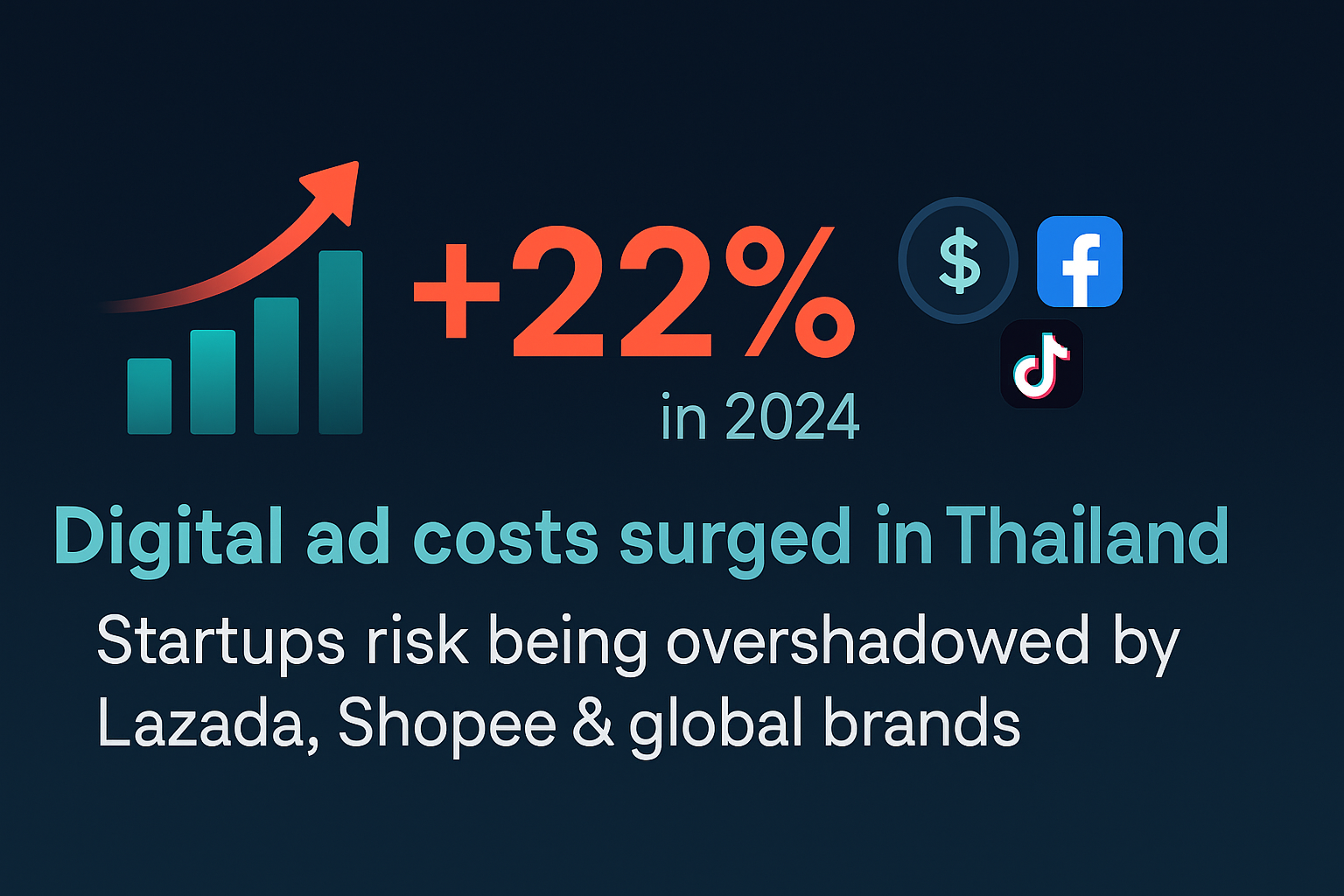
Key challenges include:
High ad spend vs low returns – Rising CPC and CPM make scaling tough.
Price competition with large platforms – Flash sales, vouchers, and free shipping dominate buyer decisions.
Limited brand trust – Many Thai shoppers prefer established platforms for security and refunds.
Regulatory complexity – New ecommerce tax laws in Thailand add compliance challenges.
Cash on delivery reliance – Over 40% of Thai online buyers still prefer COD, adding risk for small sellers.
Another pressing issue is customer loyalty. Thai shoppers are extremely price-sensitive. In 2025, 72% of buyers said discounts influence final purchase decisions. Competing only on discounts pushes startups into a race to the bottom.
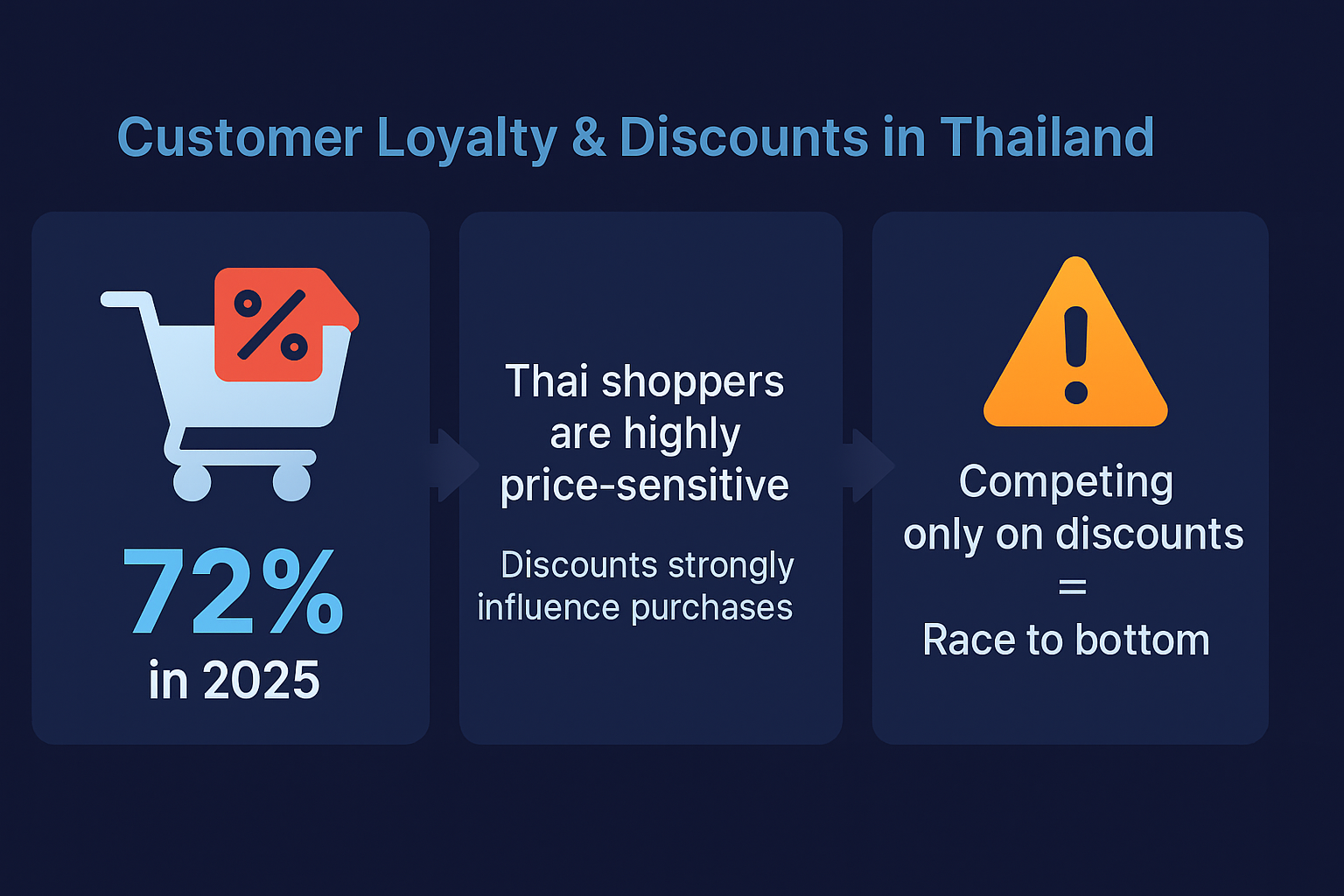
Finally, technology integration is critical. Lazada and Shopee use advanced AI tools for personalization, fraud detection, and product recommendations. Without investing in martech and automation, startups may struggle to provide similar customer experiences. For e-commerce startups in Thailand, these challenges underscore the importance of focusing on niche targeting, building trust, and implementing long-term loyalty strategies, rather than competing directly with Lazada and Shopee on logistics or discounts.
Marketing Strategies to Win Against Lazada & Shopee
Winning in Thailand’s ecommerce market requires startup marketing strategies that focus on visibility, trust, and niche positioning. Competing directly with Lazada and Shopee on discounts or shipping is unrealistic. Instead, startups should build customer experiences that large platforms can’t replicate.
One strong strategy is search engine optimization for ecommerce. Many Thai shoppers begin their journey on Google. Ranking for long-tail keywords such as “organic skincare Thailand” or “custom home décor Bangkok” helps startups capture intent-driven buyers before they reach Lazada or Shopee. Local SEO, including Google Business Profiles, is also essential for hybrid online-to-offline models.
Another powerful approach is social commerce marketing. Platforms like TikTok, Facebook, and Instagram dominate in Thailand. Short videos, influencer collaborations, and livestream shopping attract high-intent buyers. Startups can use micro-influencers to drive authentic engagement without massive ad budgets.
Key marketing strategies for ecommerce startups in Thailand include:
Content-driven SEO – Product blogs, tutorials, and buying guides boost organic reach.
Influencer partnerships – Affordable micro-influencers build social proof faster.
Email & LINE marketing – Direct channels nurture loyalty beyond first purchase.
Localized campaigns – Ads in Thai language resonate more than English-only campaigns.
Customer reviews & UGC – Social proof builds trust and drives conversions.
Another critical strategy is differentiation through branding. Shoppers remember stories, not just discounts. Startups that highlight sustainability, local craftsmanship, or unique product sourcing stand out. This is especially powerful in eco-conscious product marketing or wellness ecommerce in Thailand, where buyers look for values that align with their lifestyle.
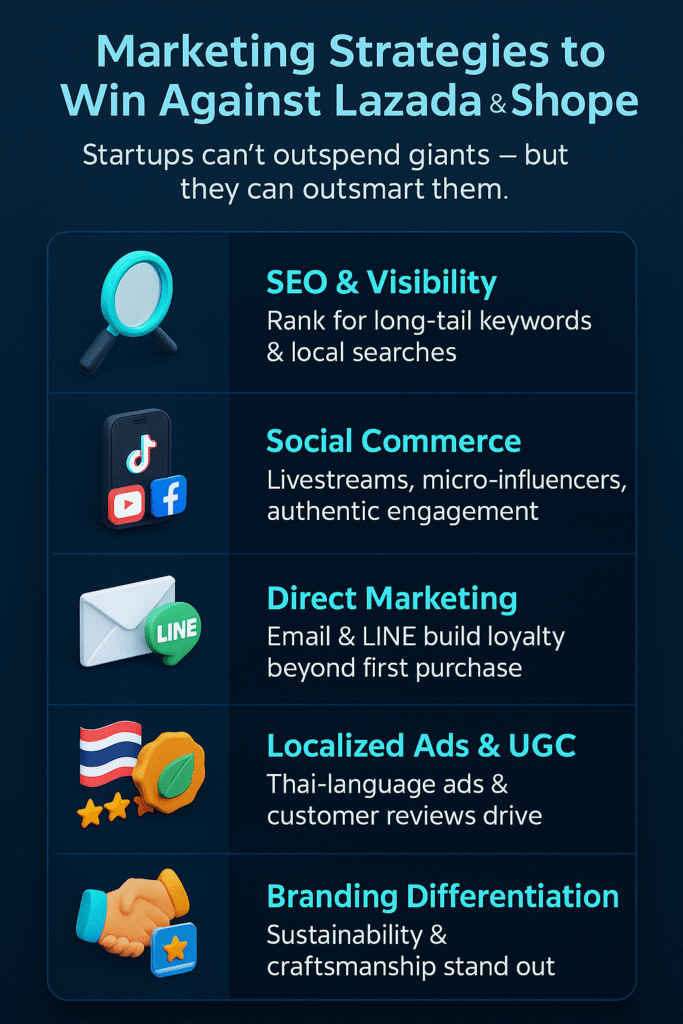
Startups should also experiment with affiliate marketing. Thailand’s affiliate industry is expanding quickly, with influencers and bloggers driving measurable sales. Using affiliate networks lowers CAC while boosting awareness in targeted niches.
That said, customer retention strategies are crucial. While Lazada and Shopee focus on scale, startups can win with personalized service, loyalty programs, and community engagement. For example, offering repeat purchase discounts, exclusive WhatsApp or LINE groups, or VIP early access to collections encourages buyers to return. In short, startups cannot outspend Lazada or Shopee. But with SEO, social commerce, UGC, and customer-first branding, they can carve out profitable spaces in Thailand’s ecommerce market.
Leveraging Technology and Martech for Competitive Advantage
For ecommerce startups in Thailand competing with Lazada & Shopee, technology is the real equalizer. Large platforms dominate because they use advanced martech stacks, AI tools, and data-driven automation. But in 2025, startups can access many of the same technologies at affordable costs. The right tools help reduce ad spend, improve customer experience, and create a path to scalable growth.
Marketing Automation and Personalization for Ecommerce Startups
One of the most effective strategies is marketing automation for e-commerce in Thailand. Automated systems enable reaching thousands of customers without the need for large teams. Tools like Klaviyo, ActiveCampaign, or Mailchimp allow startups to build automated email and LINE flows, recover abandoned carts, and improve retention rates.
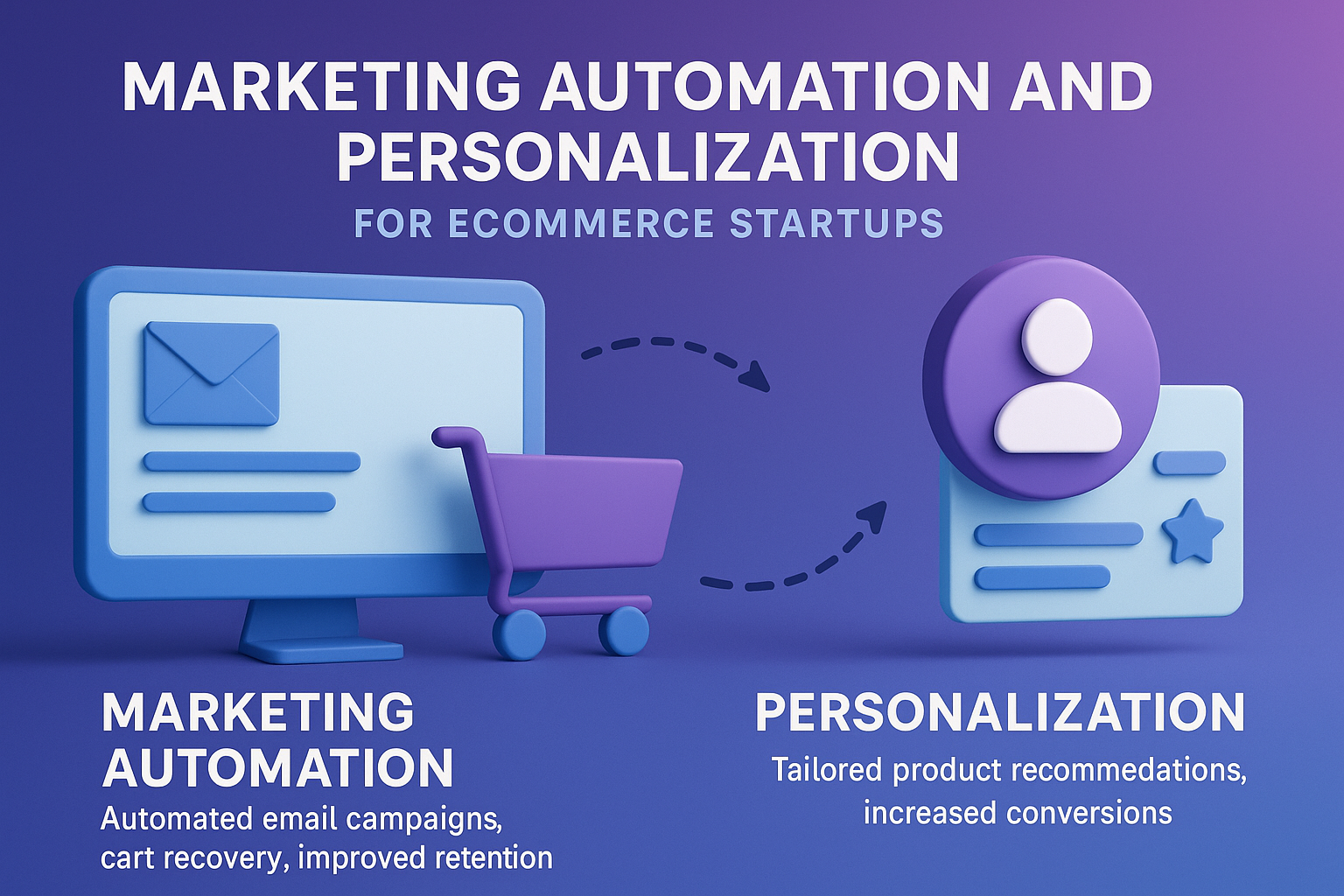
Personalization is also critical. Today’s buyers expect Lazada-level recommendations, and startups can deliver similar experiences using platforms like HubSpot or Segment. These tools analyze customer behavior and send tailored product suggestions that increase conversions. The combination of automation and personalization enables startups to compete on customer relationships, rather than just discounts.
Martech Tools that Drive Competitive Advantage
Another area where startups gain ground is AI-powered e-commerce personalization. Affordable solutions like Tidio or ManyChat give small brands access to chatbots, predictive product suggestions, and automated upsell campaigns. Customers receive fast answers and customized recommendations, increasing loyalty.
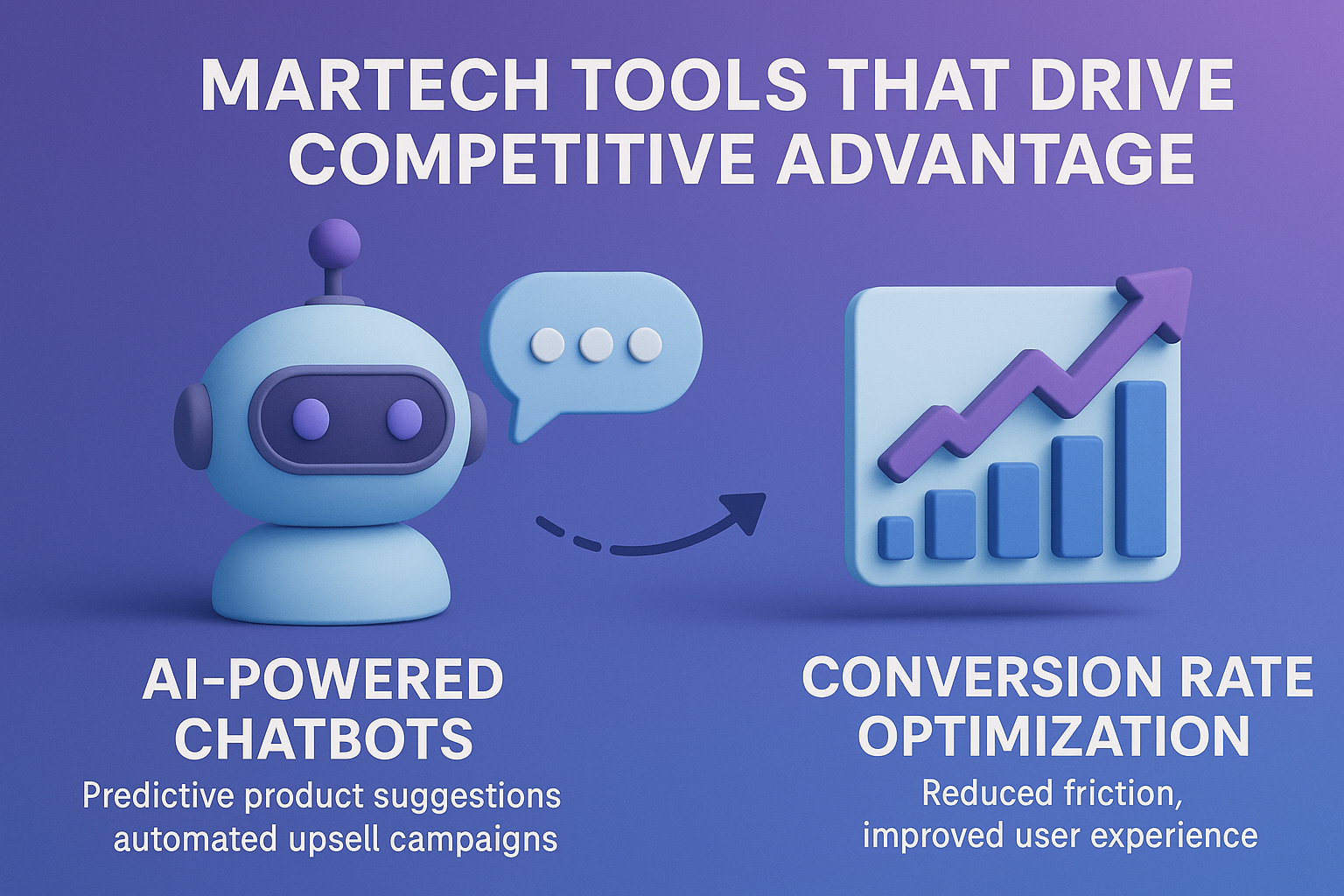
At the same time, conversion rate optimization (CRO) tools like Hotjar or Crazy Egg reveal friction in the buyer journey, while SEO platforms such as SEMrush or Ahrefs help capture organic demand. Supply chain platforms like TradeGecko or Zoho Inventory improve efficiency and prevent costly stockouts.
Here’s a quick overview of martech solutions startups should compare:
| Martech Area | Example Tools | Startup Advantage |
|---|---|---|
| Marketing Automation | Klaviyo, Mailchimp | Automated customer nurturing and cart recovery |
| Personalization | HubSpot, Segment | Higher conversion rates through tailored offers |
| AI Chatbots | Tidio, ManyChat | Faster response times and 24/7 service |
| SEO & Content | SEMrush, Ahrefs | Capture organic traffic before Lazada & Shopee |
| CRO & Analytics | Hotjar, GA4, Mixpanel | Improve UX and track performance metrics |
| Inventory Tech | TradeGecko, Zoho Inventory | Prevent stockouts and improve efficiency |
By building the right martech stack for e-commerce startups in Thailand, founders can achieve growth without the massive budgets of Lazada or Shopee. The difference lies in agility: while the giants operate on scale, startups can win through targeted personalization, cost-efficient automation, and customer-first innovation.
Case Studies – How Ecommerce Startups in Thailand Grow Against Lazada & Shopee
Learning from real-world examples is one of the best ways to understand how e-commerce startups in Thailand can compete with Lazada and Shopee in 2025. While these platforms dominate with scale, smaller brands are finding growth through clever positioning, technology adoption, and niche targeting. The following case studies highlight how agility and creativity allow startups to carve out their share of the e-commerce market.
Case Study 1: A Thai Organic Skincare Brand Winning with Niche SEO
A Bangkok-based organic skincare startup faced a tough challenge. Competing against Lazada’s beauty categories meant high ad costs and low visibility. Instead of fighting on paid ads, the founders doubled down on ecommerce SEO in Thailand. They built keyword-rich content targeting terms like “best organic skincare Thailand” and “chemical-free face cream Bangkok.”
They also invested in influencer partnerships with eco-conscious Thai creators, generating backlinks and authentic social proof. Instead of relying on Lazada’s logistics, they offered same-day Bangkok delivery and free trial packs. This mix of local SEO, influencer marketing, and customer experience gave them a competitive edge.
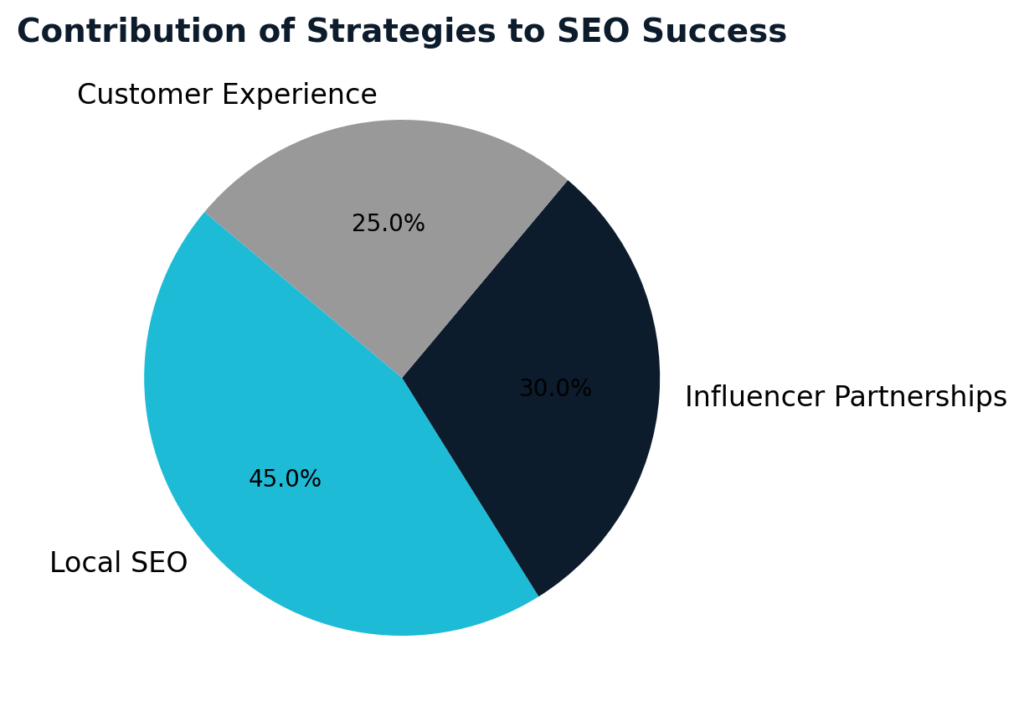
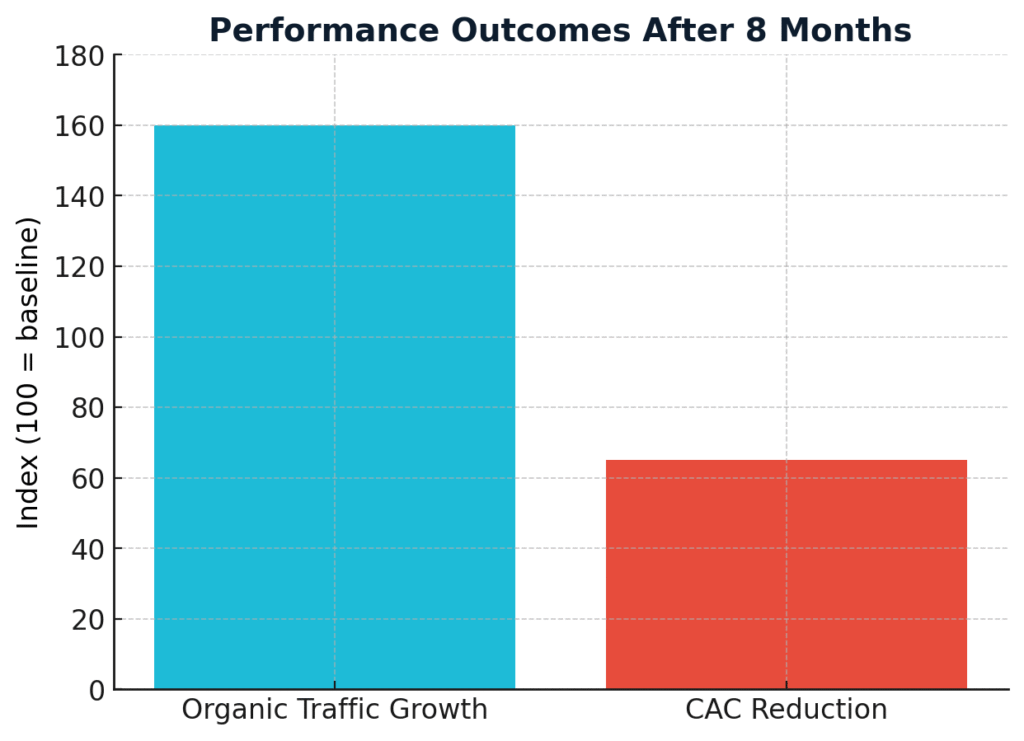
Results were clear: organic traffic grew 160% within eight months, and customer acquisition cost dropped by 35%. By focusing on a niche category, the startup avoided head-to-head competition with Shopee’s mass-market sellers while building a loyal community of repeat buyers. This case proves that niche ecommerce startups in Thailand can outpace giants when they align their SEO strategy with customer values.
Case Study 2: A Chiang Mai Handicraft Store Scaling Through Social Commerce
Another success story comes from a Chiang Mai-based handicraft store. Competing against Lazada’s massive home décor catalog seemed impossible, but they leaned into social commerce in Thailand. Instead of listing all products on marketplaces, they built a direct-to-consumer brand through TikTok Shop, Instagram Reels, and Facebook Marketplace.
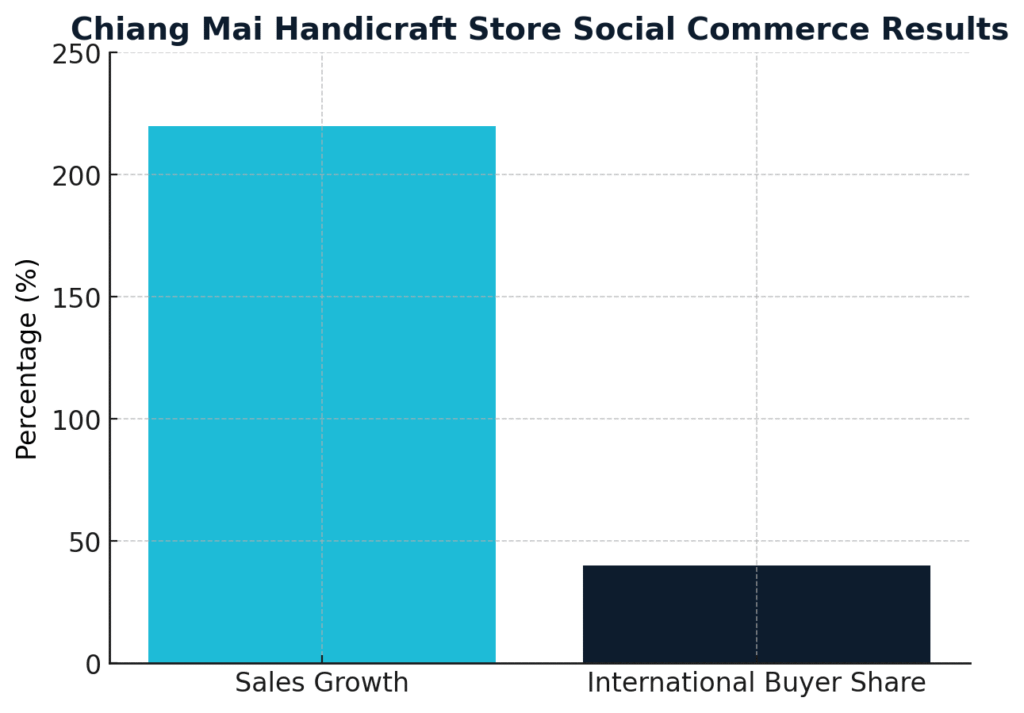
Their approach was storytelling-driven. Short videos showcased artisans handcrafting furniture and decorative items, connecting with buyers seeking authenticity. Paid TikTok campaigns targeted expats and tourists looking for Thai home décor shipped abroad. They also offered bundles like “Chiang Mai living sets,” which Lazada’s generic sellers couldn’t replicate.
Tech played a role, too. By integrating Shopify with Thai logistics providers, they streamlined fulfillment and reduced delays. Conversion tracking via GA4 helped optimize campaigns, while chatbots handled customer inquiries 24/7.
Within a year, sales increased 220%, with 40% coming from international buyers who never considered Lazada or Shopee. This demonstrates that cross-border ecommerce startups in Thailand can scale faster by embracing social-first strategies and combining them with smart martech integrations.
Challenges for Ecommerce Startups Competing with Lazada & Shopee in 2025
Building a profitable online business in Thailand is exciting, but competing with Lazada and Shopee in 2025 comes with serious hurdles. Startups need to understand these challenges before creating their growth strategies.
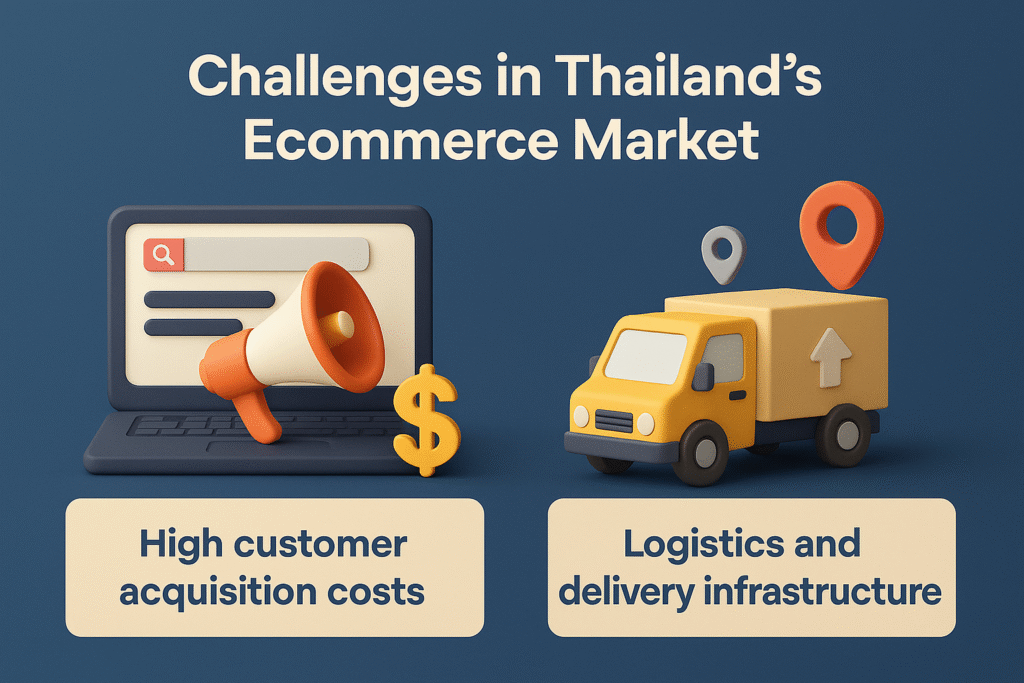
1. High Customer Acquisition Costs in Thailand’s Ecommerce Market
One of the biggest e-commerce challenges in Thailand is customer acquisition cost (CAC). With Lazada and Shopee running daily promotions and flash sales, smaller startups often need to overspend on Google Ads, TikTok campaigns, and Facebook marketing just to get noticed. Even with strong SEO, ranking against Lazada’s product pages is tough. Startups need highly targeted strategies to avoid bleeding cash in early growth phases.
2. Logistics and Delivery Infrastructure
Shopee and Lazada’s lightning-fast shipping shape delivery expectations in Thailand. Consumers expect free or next-day delivery as the norm. For smaller e-commerce startups, matching this requires heavy investment in warehousing and fulfillment partnerships. Inconsistent regional logistics outside Bangkok and Chiang Mai add another layer of complexity, especially for niche sellers targeting rural markets.
3. Competing with Discount-Driven Shopping Behavior
Thai online buyers are highly price-sensitive. Lazada and Shopee hook customers with vouchers, cashback programs, and mega-sales like 11.11 or 12.12. Startups without deep budgets struggle to compete on discounts. Instead, they must build value through brand loyalty, unique products, and personalized shopping experiences. Without this, buyers quickly bounce back to cheaper marketplace listings.
4. Limited Visibility Without Marketplaces
Getting visibility is another challenge. Lazada and Shopee dominate Google SERPs for e-commerce in Thailand, ranking for most high-intent searches. For startups running independent sites, organic discovery is harder without significant SEO investment, influencer partnerships, and PR campaigns. This forces many new businesses to list on Lazada or Shopee, which reduces profit margins due to platform fees.
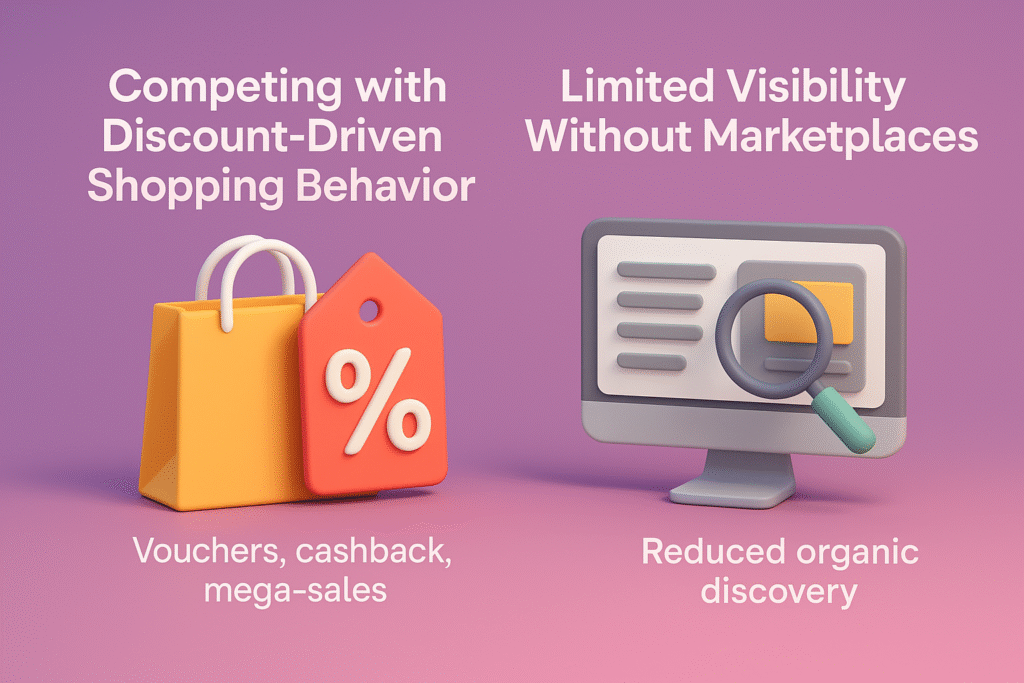
5. Funding and Scalability Issues
Finally, many Thai e-commerce startups struggle with funding. Investors often favor scalable SaaS or fintech ventures over retail businesses with lower margins. Without capital, it’s hard to invest in tech, marketing, or inventory. This makes alternative funding models, government grants, and accelerators essential for founders who want to challenge Lazada and Shopee in the long term.
Strategies for Beating Lazada and Shopee in Niche Markets
For ecommerce startups in Thailand competing with Lazada and Shopee, survival in 2025 depends on smart niche strategies. Startups cannot win on price or logistics, but they can succeed by focusing on underserved segments, creating loyalty, and building strong brand presence. By combining niche SEO, influencer marketing, and social commerce strategies in Thailand, founders can capture attention where Lazada and Shopee don’t dominate. Personalized shopping experiences, storytelling, and authentic branding are what win customers in markets oversaturated with generic products.
Here’s a breakdown of effective approaches:
| Strategy | Why It Works in Thailand 2025 | Example Use Case |
|---|---|---|
| Niche SEO | Targets long-tail, high-intent searches | “Organic skincare Thailand” |
| Social Commerce | Builds trust through influencers and UGC | TikTok Shop campaigns |
| Localized Storytelling | Connects with Thai culture and values | Chiang Mai artisan crafts |
| Subscription Models | Creates recurring revenue | Monthly Thai snack boxes |
| Premium Customer Service | Compensates for slower logistics | 24/7 chat support in Thai |
With the proper positioning, Thai ecommerce startups can thrive by building value in areas that Lazada and Shopee overlook
Global Expansion Opportunities for Thai Ecommerce Startups
In 2025, more Thai e-commerce startups are exploring global expansion opportunities as the local market becomes increasingly competitive. Competing with Lazada and Shopee is challenging, but expanding beyond Thailand offers founders new avenues for growth. With cross-border ecommerce tools, improved logistics, and supportive trade policies, Thai startups can sell directly to international buyers.
Why Cross-Border Ecommerce Matters for Thailand?
Cross-border ecommerce in Thailand is growing fast, fueled by demand for Thai food, wellness, beauty, and fashion products abroad. According to the World Bank (2025), ASEAN is one of the fastest-growing e-commerce regions, with projected growth of 15% annually. Thai startups that tap into this trend can reduce reliance on Lazada or Shopee and create direct revenue streams from overseas buyers.
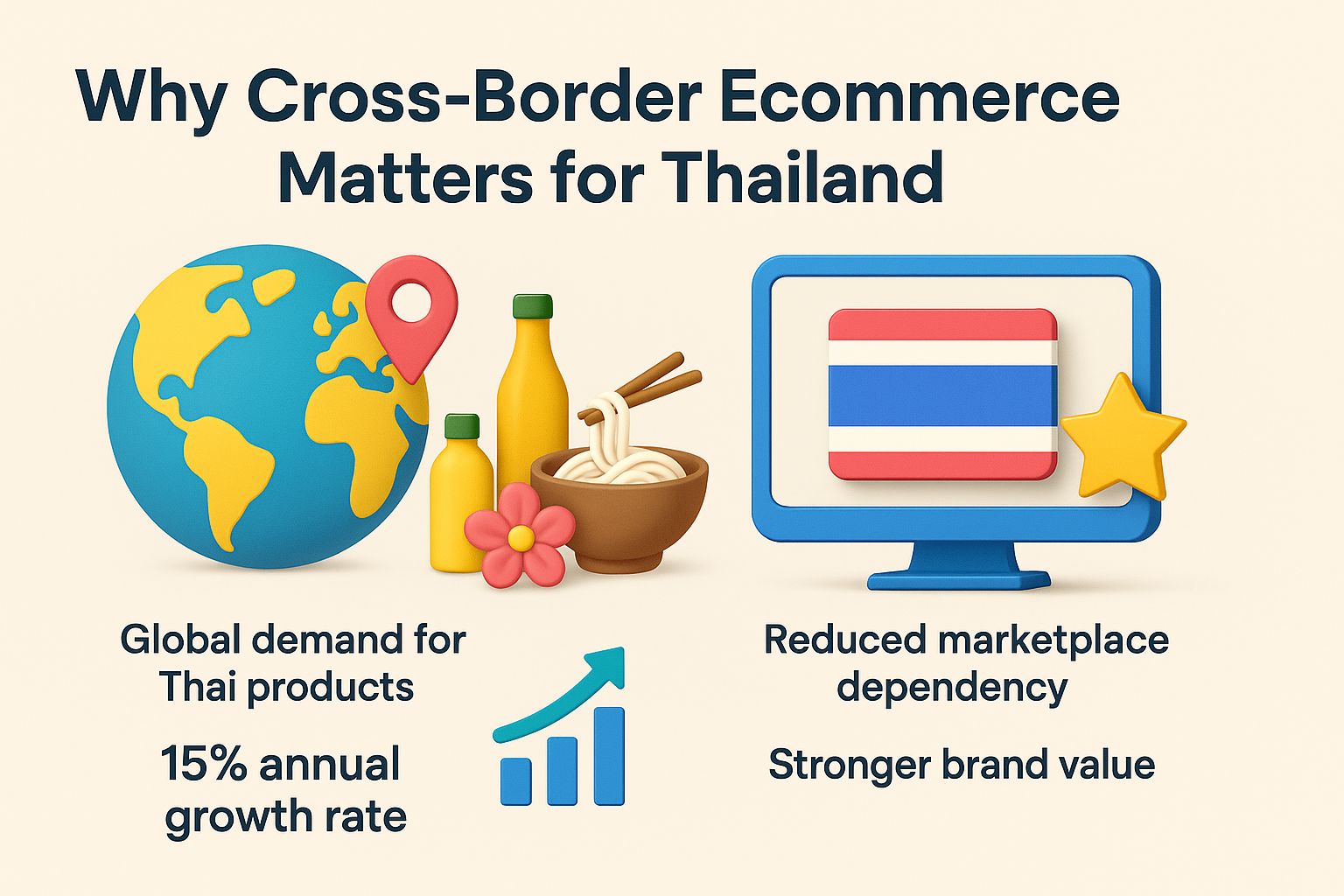
Expanding globally also allows founders to strengthen their brands. Instead of being seen as marketplace sellers, startups can build independent ecommerce identities that highlight Thai culture, sustainability, and quality. Global buyers often look for authentic, unique brands rather than price-driven sellers, giving Thai startups an advantage.
How Thai Startups Can Enter Global Markets
E-commerce startups in Thailand have multiple strategies to expand internationally:
ASEAN-first expansion: Neighboring countries like Vietnam, Indonesia, and Malaysia offer strong demand for Thai products.
China and cross-border platforms: Alibaba and JD.com open doors for Thai goods to reach millions of Chinese consumers.
Western markets: Thai beauty and wellness brands are gaining traction in Europe and the US, especially with clean-label and organic products.
Amazon Global Selling: Many Thai startups are entering the US and EU by listing products on Amazon while keeping control of branding.
The Role of Partnerships and Ecosystem Support
Expanding into global markets is not easy for Thai startups. Logistics, payment gateways, and compliance create challenges. However, strategic partnerships can reduce barriers. Thai founders often collaborate with cross-border logistics companies, digital payment providers, and global ecommerce platforms to simplify operations.
Government programs and trade missions are also supporting startups. The Thailand Board of Investment (BOI, 2025) notes that export-focused e-commerce startups receive incentives for digital innovation and overseas trade promotion. These initiatives make it easier for founders to compete with Lazada and Shopee by accessing financial support and international exposure.
Why Global Expansion Is Critical for Thai Startups in 2025?
Relying solely on domestic ecommerce channels can trap startups in a low-margin cycle, where Lazada and Shopee control pricing and visibility. Going global creates diversification, a stronger brand identity, and higher profit margins.
For ecommerce startups in Bangkok and Chiang Mai, the path to global success often starts with strong local branding, effective SEO strategies, and conversion-focused websites that are optimized for international traffic. Building credibility with trust signals like reviews, certifications, and multilingual support also improves global growth.
In 2025, Thai startups that dare to go beyond Lazada and Shopee and explore ASEAN, China, and Western markets will be the ones to build long-lasting ecommerce brands. For founders, this is not just about survival – it is about becoming global players in the digital economy.
The Role of aboveA in Helping Thai Ecommerce Startups Scale in 2025
In 2025, many Thai ecommerce startups face the same challenge: how to compete with Lazada and Shopee without losing identity or burning through budgets. This is where aboveA provides a different path. Instead of pushing startups to rely solely on discount-driven platforms, aboveA helps founders create sustainable digital growth systems tailored for their markets.
By focusing on SEO for ecommerce in Thailand, aboveA ensures startups can rank for high-intent searches beyond the reach of Shopee and Lazada. Founders gain visibility through optimized product listings, localized content strategies, and structured keyword research. Unlike marketplaces, where sellers are often buried under endless competition, aboveA positions brands to get discovered directly by customers.
Another strength lies in customer journey design and conversion-focused marketing. Startups often attract traffic but fail to convert because of weak storytelling or poor UX. aboveA bridges that gap by aligning every digital touchpoint with buyer intent, from landing pages to remarketing flows.
What makes aboveA unique compared to other agencies is its dual role as both a growth partner and an incubator. Through aboveA Academy and Capital Programs, startups not only receive marketing expertise but also mentorship and access to funding opportunities. This holistic approach enables Thai founders to scale faster, reduce their dependence on marketplaces, and create globally distinctive brands.
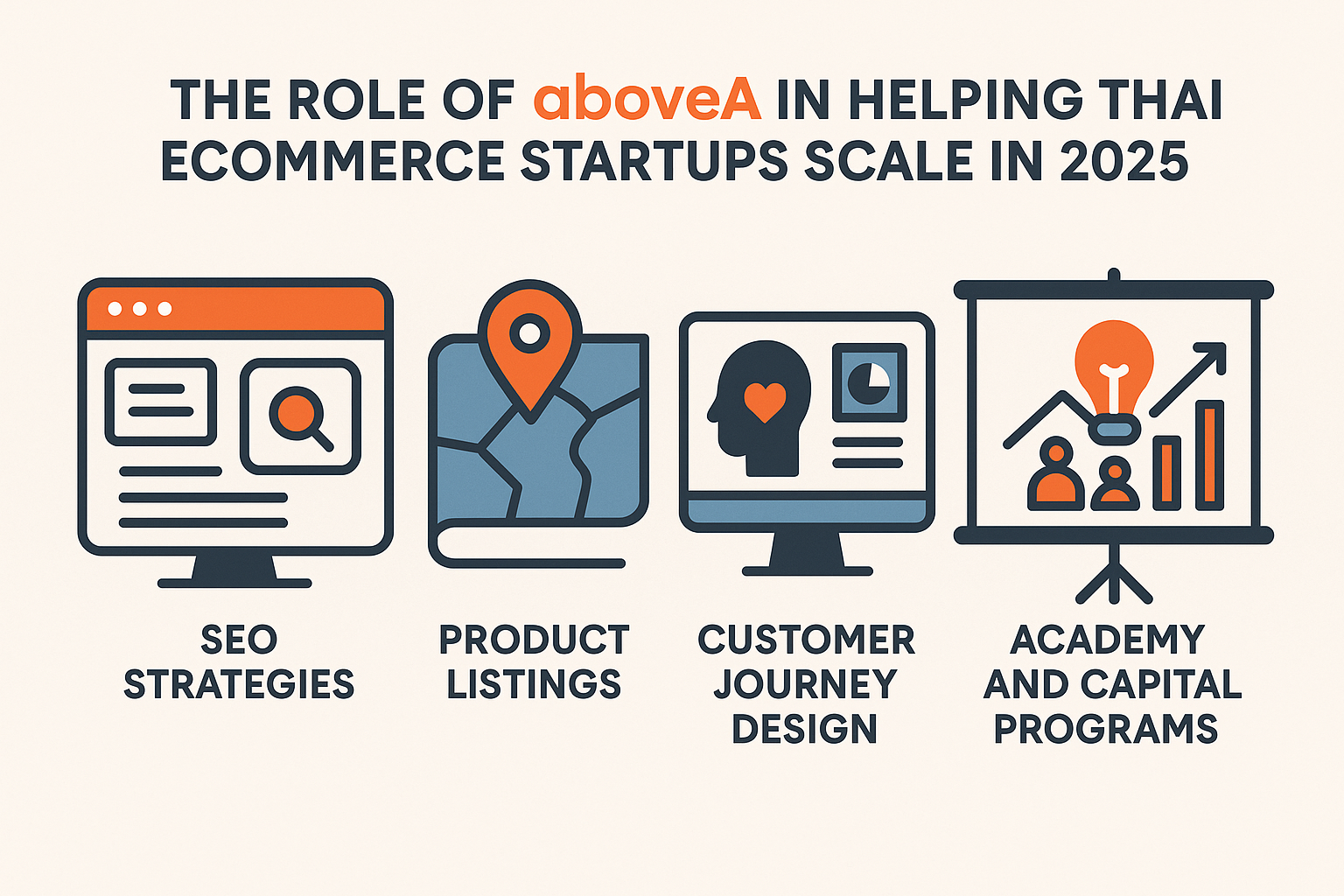
Conclusion
The e-commerce landscape in Thailand is evolving quickly, and startups face both exciting opportunities and intense competition from Lazada and Shopee in 2025. Success depends on carving out niches, building authentic customer relationships, and investing in long-term digital strategies rather than short-term discounts. Founders in Bangkok, Chiang Mai, and beyond must adapt to shifting buyer expectations and rising costs. With the proper guidance, tools, and strategic partners like aboveA, Thai ecommerce startups can compete effectively, attract loyal customers, and scale beyond local markets into regional and global success stories.
Frequently Asked Questions
How can Thai ecommerce startups compete with Lazada and Shopee in 2025?
Thai ecommerce startups can compete by focusing on niche markets, leveraging SEO, storytelling, and social commerce, while building loyal communities that Lazada and Shopee cannot replicate.
What marketing strategies work best for ecommerce startups in Thailand?
The most effective strategies include niche SEO, influencer-driven social commerce, localized storytelling, and customer journey optimization to attract high-intent buyers and reduce reliance on Lazada or Shopee.
Why do ecommerce startups in Bangkok and Chiang Mai struggle against large marketplaces?
Startups often struggle due to smaller budgets, slower logistics, and less brand visibility compared to Lazada and Shopee, but creative strategies help balance competition.
How does aboveA support ecommerce startups in Thailand?
aboveA helps Thai startups scale with SEO, conversion-focused design, customer behavior strategies, and incubator support, offering an alternative growth path beyond Lazada and Shopee’s marketplace constraints.

